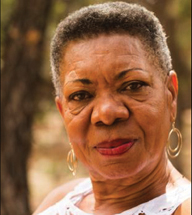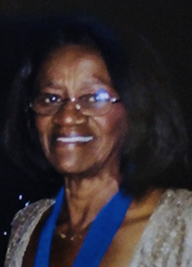
By Audrey Peterman
When I received the invitation from Westside Gazette publisher Bobby Henry to cover the Panel Conversation highlighting the Science of Climate Change, its Impacts, Local Actions and Solution, and the Importance of Environmental & Climate Justice May 15, I felt a shiver in my veins. The fact that it is focused on Florida, was organized by the NAACP and FAMU among others and includes several Black environmental leaders that we worked with years ago made it clear – this is an issue that Black people take seriously now.
It also felt like dejavu all over again.

“Global Climate Change is no longer a question; it’ a Fact! The question for Floridians is not when, but to what degree. To what degree will Florida with its countless springs, lakes, and miles of coastline be impacted? To what degree will the 20 million individuals that call it home be impacted, especially Black, Indigenous, and People of Color? Join the NAACP Florida State Conference, Florida A&M University School of the Environment, and the Space Coast Florida National Technical Association as they host a stellar group of experts to discuss the Science of Climate, It’s Impacts, Local Actions and Solutions, and the Importance of Environmental & Climate Justice,” reads the invitation.
The speakers will include Dr. Richard Gragg, Founding Director (1998-2011) of the Center for Environmental Equity and Justice at FAMU; Jacqueline Patterson, Senior Director of NAACP Environmental & Climate Justice Program; NAACP FSC President, Adora Obi Nweze, and Chairman of the NAACP, Leon Russel.
So I conclude that environmental justice has gone main stream in the Black community. And not a moment too soon!
I feel somewhat impatient and quite chagrined because as far back as 1999, more than 21 years ago, South Florida’s primary environmental justice advocate Leola McCoy (May God rest her soul) and I were giving everything we had to help ensure that the environmental issues affecting Black Americans in Florida were addressed. This story from my book Legacy on the Land flashed to mind:
“…how often Leola and I had driven the Florida Turnpike from Fort Lauderdale to Tallahasse to press for environmental justice. In August 1999 we learned that Florida’s State Department of Environmental Protection was holding a series of forums on contaminated soils, and the standards to which they should be cleaned up. Since the contaminated soils were mostly in areas where people of color and the poor lived, Leola and I had a serious interest in being part of the discussion. We’d only learned about the first forum days before it took place, when a memo came across Frank’s desk at the Audubon Society. Parts of the eastern Everglades were on fire that summer, and we literally drove through smoke and flames on the turnpike to get to Tallahassee.
“Lee made an indelible impression on the discussions, as we provided the only counterpoint to the business lobbyists and consultants who argued that the standards should be relaxed to leave higher levers of pollution in the soils, or it would cost their employers money. Our position to the DEP was that the soils should be cleaned up to the point where it was most supportive of human health.
“Dr. Richard Gragg represented FAMU’s Environmental Sciences Center, which was recently awarded just over $650,000 by the State Legislature to put into effect an environmental justice program. State Rep. Josephus Eggelleton represented the district where the Wingate Superfund Site was located and had spearheaded the creation of the EJ program at FAMU. Attorney David Ludder from the Legal Environment Assistance Foundation also supported our position, and the organization was advising Leola on the cleanup of the Wingate Superfund Site. Leola and I were later appointed to the Advisory Board of the Center, but we felt that it wasn’t moving as aggressively as it needed to, given the extent of the problem….”
I feel impelled to share this story to point out that the push for environmental justice has been going on for decades in Florida, and the level of progress has been glacial. A majority of people who are not as yet affected appear to feel that it has nothing to do with them. The energy needed to bring momentum has been severely lacking, despite the best efforts of multiple entities, including the Fort Lauderdale Branch NAACP which briefly had an EJ subcommittee.
Two decades later, the effects of climate change and sea level rise are poised to have a devastating effect on Black Floridians through flooding, housing pressures from people fleeing the beaches and generally being the most vulnerable because of environmental Injustice.
I hope this history puts some urgency to the EJ session May 15 and what comes out of it. It can accelerate progress, or retain the status quo. The point is, we don’t have another two decades to dawdle.
For more information about the panel, please go to FLNAACP.com

